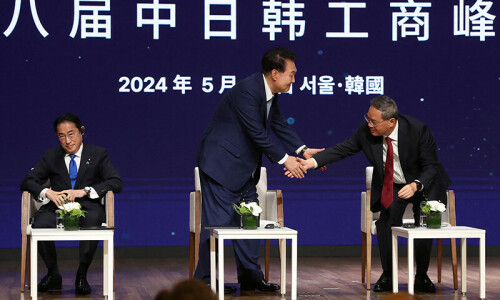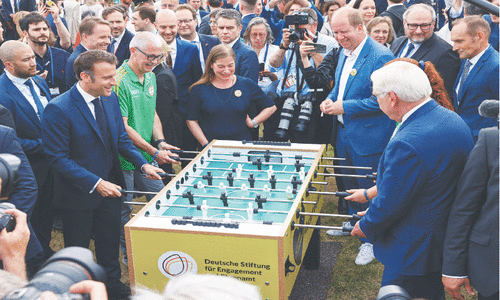NEW DELHI, June 13: Trucks, buses and some train services ground to a halt in India on Tuesday as part of a nationwide one-day strike against a government decision to raise fuel prices. In the capital New Delhi, hundreds of protesters waved placards and shouted slogans near the parliament while others burnt an effigy of Prime Minister Manmohan Singh.
Communist parties that lend crucial support to the Congress-led coalition government, called the strike to demand a rollback of last week’s price increases for diesel and petrol.
In Agartala, the capital of Tripura state, public transport came to a standstill. Tripura is one of three communist-ruled states, along with Kerala and West Bengal.
A key truck drivers’ union, the All India Motor Transport Congress, said thousands of lorries carrying iron ore stayed off the road Tuesday in the eastern coastal state of Orissa.
A New Delhi-based trade body, the Associated Chambers of Commerce and Industry (ASSOCHAM), said late Tuesday that the strike had cost the country up to 10 billion rupees (222 million dollars) in revenue.
“Feedback received from various constituents of the chamber from across the country revealed that routine business activities were paralysed to a large extent,” the United News of India news agency quoted ASSOCHAM President Anil K Agarwal as saying.
This put “industry to great hardship as its cargo and export consignments could not be moved to their destinations,” Agarwal said.
The Indian government raised the price of petrol by nine per cent to Rs 47.49 per litre and the price of diesel by 6.5 per cent to Rs 32.45, effective June 6.
Several states have decided to forgo the extra tax revenue that would be raised from the hike. But Mr Singh has ruled out any roll-back despite calls from communist party allies and even the Congress party itself for him to do so.
The Bharatiya Janata Party, which attempted to raise pump prices to reflect costs before it lost power in May 2004, has opposed the strike.
Petrol and diesel revenues are used to subsidise fuels such as kerosene and liquefied petroleum gas used by the poor for cooking. The prices for those fuels were left unchanged.
India imports more than 70 per cent of its energy needs but has been reluctant to raise prices for refined products because of political opposition and fears that it will stoke inflation.
India last raised fuel prices nine months ago in response to a surge in world crude oil prices, which have risen by more than 50 per cent since the end of 2004 and now hover at around 70 dollars a barrel. —AFP













































Dear visitor, the comments section is undergoing an overhaul and will return soon.